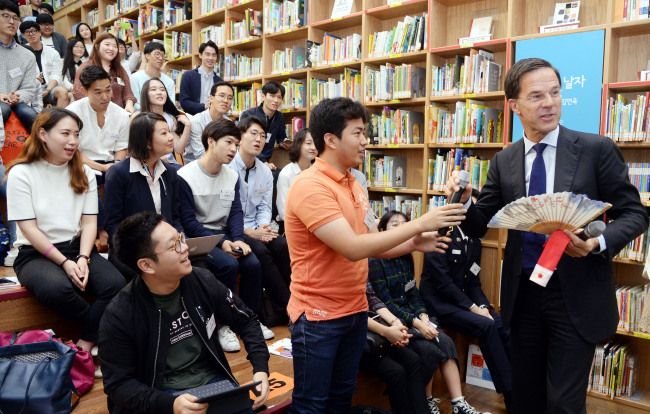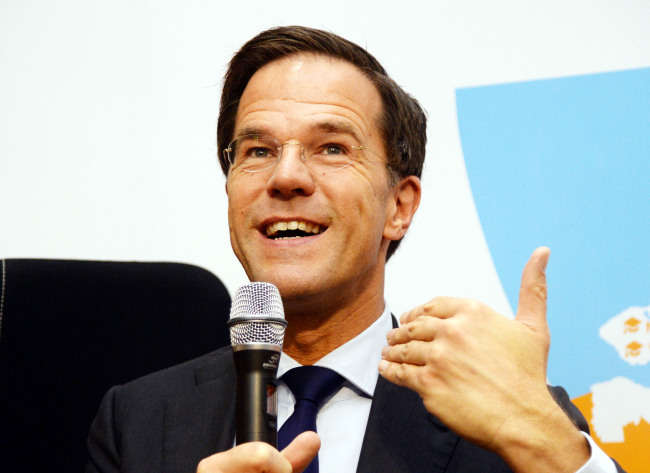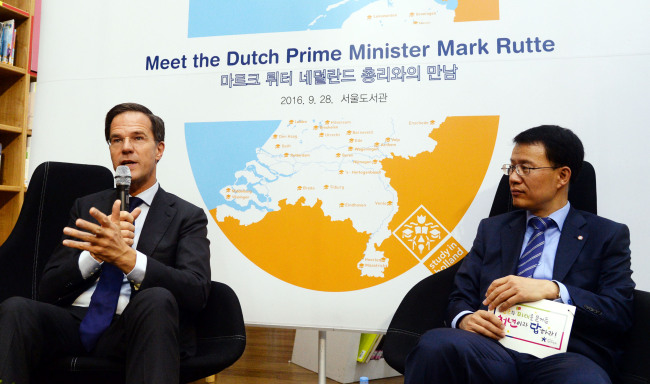Dutch Prime Minister beckons young Koreans to Netherlands
By Korea HeraldPublished : Oct. 4, 2016 - 00:13
Addressing a crowd of Korean university students, Dutch Prime Minister Mark Rutte said Wednesday that his country welcomes young global talents to study and work in the world’s leading innovation-driven economy.
In a meeting at the Seoul Metropolitan Library, Rutte highlighted opportunities in the Netherlands, famous for its liberal society and innovative marketplace.
“There is no hierarchy in the Netherlands,” he stressed in front of some 70 students at the bottom of the hall. Pointing up toward the stairs, he added, “Much like the space we are in, professors look up to the students, and so do the prime minister and secretaries with the people. This has allowed our country’s creativity, openness and venturing spirit.”

Rutte -- Holland’s first liberal prime minister in 92 years -- came to Korea from Sept. 26 to 28 on his first state visit since being elected in October 2014. His tour returned South Korean President Park Geun-hye’s visit to the northwestern European country in March 2014.
Underlining the industrious Dutch startup scene, the politician said small and medium-sized enterprises make up the bulk of the national economy. Alongside the UK, France, Finland and Luxembourg, among others, the Netherlands has one of Europe’s leading startup ecosystems.
As a key policy that encourages entrepreneurship, Rutte said the government notifies the amount of tax to be paid by companies five to 10 years ahead. The corporate response to this has been positive, he claimed, as it allows future planning and financial forecast.
“The relative lack of policies has actually freed up creative initiatives,” he underscored, adding that “creative people don’t like to follow regulations. They like to do things their own way.”
He also pointed out that Holland has many international schools, where curriculums are taught in English for students from all around the world, and solid infrastructure that allows quick travel across the country.

Park Yong-ho, chairman of the Presidential Committee on Young Generation, which organized the event with Nuffic Neso Korea and the Dutch embassy, argued that Netherland’s StartupDelta Initiative has much in common with Korea’s creative economy drive.
Despite its small territory of just over 41,500 square kilometers -- less than half of South Korea -- and a population of 17 million, the Netherlands is a leading global economic powerhouse with the world’s fifth-largest trade volume, one spot ahead of Korea. Last year, the Netherlands invested over $25 billion in Korea as the top investing country in the European Union.
The country has strengths in creative industries, advanced technologies and economic reforms. Multinational corporations such as Shell, Philips and Unilever are Dutch enterprises, and 355 Korean corporations are operating in the country.
Its advanced agricultural industry -- as the world’s second-largest agricultural exporting economy -- has actively incorporated automation, mobile computing, telecommunications networks, genetic research and development, environmentally friendly production and electric driving systems to prepare for the Fourth Industrial Revolution.
Rutte came with a trade delegation of over 65 companies representing various sectors, half of them in agriculture. Regarding economic partnerships with Korean firms, the prime minister said he was keen on supporting linkages in agriculture, creativity sector and advanced technology.

During a summit at Cheong Wa Dae on Tuesday, the two leaders signed memorandums of understanding encompassing technological innovation, energy, agriculture, tourism and information communications technology.
Cheong Wa Dae said the Netherlands has strengths in finance, technology and logistics and distribution, while Korea has advantages in advanced technology and production, adding complementary investment is possible.
Marking the 55th anniversary of established diplomatic relations, they also elevated the status of bilateral ties to a “comprehensive and future-oriented partnership” and adopted a joint declaration expressing both sides’ will and plans for further cooperation in political and strategic dialogue, economic partnership, mutual understanding and international collaboration.
The two countries also signed a memorandum of understanding on a working holiday scheme for young Korean adults between 18 and 30, who would be allowed to travel and work in the Netherlands up to one year.
The program follows the first scheme implemented from June 2014 through May this year, through which 194 Koreans visited Holland.
Korea has memorandums of understanding or agreements on the working holiday program with 21 countries worldwide, including 13 from Europe. Over 4,200 Koreans went to Europe last year through the arrangement, and some 1,200 Korean students are currently studying in the Netherlands.
By Joel Lee (joel@heraldcorp.com)
-
Articles by Korea Herald









![[Hello India] Hyundai Motor vows to boost 'clean mobility' in India](http://res.heraldm.com/phpwas/restmb_idxmake.php?idx=644&simg=/content/image/2024/04/25/20240425050672_0.jpg&u=)










